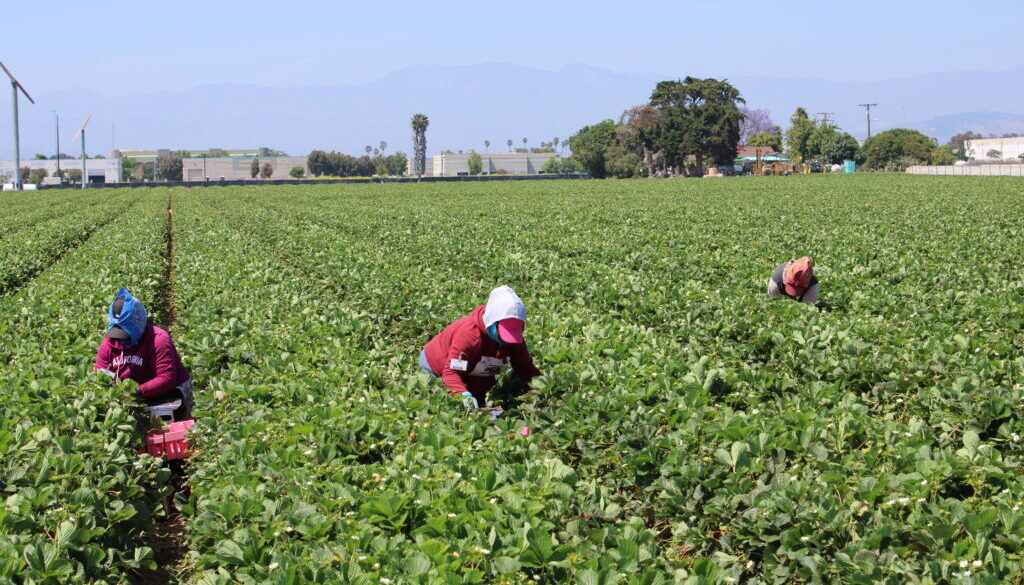Bill to strengthen pesticide protections offers farm bill “wish list”
(Updates to add comments from Sen. Booker’s office)
Advocates are cheering a move by US Sen. Cory Booker to reintroduce a bill aimed at banning several pesticides linked to human and environmental health problems, but acknowledge the measure faces a long and steep uphill journey if it ever is to become law.
The “Protect America’s Children from Toxic Pesticides Act of 2023” (PACTPA) would outlaw several widely used chemicals popular with farmers to fight weeds and insects harmful to crops.
Supporters say PACTPA would help protect children, farmworkers, and residents of rural communities who suffer disproportionately from exposure to pesticides shown through scientific research to cause a range of health issues from cognitive problems to cancers.
But the agrochemical industry has dubbed prior similar efforts as threatening the “safety, productivity, and sustainability of our nation’s food supply.”
Among other provisions, the bill would help enable local communities to enact their own protective legislation and would put in place strict rules requiring employers of farmworkers to report pesticide-related injuries.
Booker initially introduced the bill in 2021 but it failed to gain traction amid strong resistance from powerful farm lobbying groups and the agrochemical industry, which reaps billions of dollars in annual revenues from pesticide sales. The new bill faces similar challenges, acknowledged by Booker and his staff.
Given Republican opposition control of the US House of Representatives there is “no realistic chance” for the pesticide bans called for in the bill to become law anytime soon, said Adam Zipkin, counsel to Booker. “It’s going to be such a heavy lift. Given the dynamics we now have in the House it just makes everything harder.”
Booker will keep advocating for this and other agriculture-related reforms but hopes in the near term to focus on getting some other elements of industry reform into the 2023 Farm Bill, according to Zipkin. The farm bill is a package of legislation that governs a wide range of food and farming programs and is typically renewed every five years.
“We have to pivot to what is the art of the possible,” Zipkin said.
Christina Stucker-Gassi, a program manager at the Northwest Center for Alternatives to Pesticides, said Booker’s bill provides a solid outline of important provisions Congress should include in the new farm bill.
“We’d like to see the Senate and House agriculture committees look at this as a wish list,” Stucker-Gassi said. “It’s high time that farmworkers are included within the farm bill in substantial ways.”
Pesticide bans
One pesticide that PACTPA specifically targets is the herbicide paraquat, which has been sold in the US market for more than 50 years. It is highly toxic to anyone who ingests even a small amount, and several studies have found that chronic exposure to paraquat contributes to the development of Parkinson’s disease.
Farmers use paraquat on roughly 15 million acres of US farmland each year to control weeds before planting their crops or to dry out crops for harvest. While paraquat has been banned in 58 countries, US government data shows that the amount of paraquat used in the United States more than tripled between 1992 and 2018.
“I don’t think that it’s a very valid stance to take that we need a chemical as toxic as paraquat to maintain the viability of our current food system,” said Stucker-Gassi.
The bill would also ban organophosphates linked to neurodevelopmental problems in children, reproductive harms, and would ban a class of insecticides known as neonicotinoids that have been associated with the collapse of pollinators around the world.
Children are especially vulnerable to pesticide exposure, said Stucker-Gassi. Their developing bodies struggle to break down toxic chemicals, and toddlers are more likely to ingest harmful chemicals since they frequently put their hands in their mouths. Kids in farmworker families often live and go to school near fields that emit airborne pesticides.
Critical of EPA
PACTPA is written as an amendment to the Federal Insecticide, Fungicide, and Rodenticide Act (FIFRA), which governs pesticide registration and use in the US, and is critical of the Environmental Protection Agency (EPA), the agency that implements FIFRA.
The EPA “regularly fails to incorporate updated scientific understanding to protect human health and the environment from the harmful effects of pesticide products… resulting in the use of billions of pounds of pesticides every year that were approved based on outdated science,” the bill states.
The bill notes that the US continues to allow the use of 72 pesticides that have been banned or are being phased out in the European Union. One provision calls for the EPA to “immediately suspend” a pesticide that is banned in the European Union or Canada. The agency would then be required to ban the pesticide in question within two years unless it found that the foreign decision was “clearly erroneous.” The EPA would not be allowed to “consider any economic analysis of the benefits or costs” in evaluating the pesticide banned by the foreign country, the bill states.
The bill also points out that the EPA approves nearly 65% of pesticides without completing “comprehensive” evaluations. Just last summer the 9th U.S. Circuit Court of Appeals issued an opinion finding that the EPA failed to properly assess the weed killer glyphosate – the active ingredient in the popular Roundup brand. The court found that the EPA ignored important scientific studies and failed to follow established guidelines for determining the cancer risk of glyphosate, and violated the Endangered Species Act in its assessment.
While FIFRA calls on the EPA to only register pesticides that do not pose “any unreasonable risk to man or the environment,” thousands of farmworkers suffer acute pesticide poisoning each year, with many others burdened by chronic conditions including cancer, Parkinson’s disease, asthma, and birth defects.
“We work with farmworkers who are afraid to report exposure incidents due to fear of retaliation, and more often pesticide handlers aren’t receiving training on just how dangerous their mixing and spraying jobs are,” Jeannie Economos, coordinator of the Pesticide Safety and Environmental Health Project for the Farmworker Association of Florida, said in a press release.
Overcoming opposition
The last time PACTPA was reintroduced, the bill faced steep opposition. In January 2022, over 350 organizations, including the National Pest Management Association and Responsible Industry for a Sound Environment, sent a letter to Congress, saying the bill, “would jeopardize the continued availability and innovation of pesticide products by imposing an unscientific and unbalanced process that could unnecessarily remove pest control options from those who need them.”
But Stucker-Gassi said the toxic pesticides have no place in the food system.
“There’s no need for these very highly potent neurotoxins to be seen as important tools moving forward,” she said. “We have the tools, we have the alternatives, and we just need the partnership to actually get them off the market and get those alternatives more widely known about and utilized.”
(Featured Image: Agricultural workers harvest strawberries in Oxnard, California. Credit: Mixteco/Indigena Community Organizing Project (MICOP).)
 EWG
EWG


